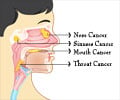A new combination of drugs, cetuximab-RT therapy with EphB4-ephrin-B2 blockade, against relapsed head and neck cancer has been suggested by experts at the University of Colorado Anschutz Medical Campus to have optimal therapeutic effect.

‘Experts suggested that a combination of drugs called cetuximab-RT therapy and EphB4-ephrin-B2 blockade may be more effective for head and neck cancer.’





"The question has been, how are cancers resisting these treatments”," says Sana Karam, MD, PhD, University of Colorado Cancer Center investigator and assistant professor of Radiation Oncology at the CU School of Medicine. To answer this question, Karam worked with first author and postdoctoral fellow, Shilpa Bhatia, to explore the genetics of tumor samples taken at the time of a patient's first surgery and then again once cancer progressed following treatment.
"By finding what was different between tumors that responded to treatment and those that had learned to resist treatment, we hoped to find some biological predictors or targets that we could exploit or manipulate to improve outcomes," Bhatia says.
What they found is that a pair of genes associated with early brain development but silent in healthy adult tissue had been turned back on in tumor samples that resisted therapy. The genes were EphB4 and its partner ephrin-B2.
"Both of these go up after the patient fails, so we thought, why don't we target them and see if that works," Karam says.
Advertisement
First, "in the cisplatin arm, tumors laughed at the new inhibitor therapy," Karam says. But in models in which EphB4-ephrin-B2 inhibition was added to treatment with the EGFR inhibitor cetuximab, the addition of EphB4-ephrin-B2 inhibition dramatically reduced tumor size and resulted in better overall survival.
Advertisement
"EphB4-ephrin-B2 inhibitors are currently in clinical trials in other disease settings, and our work shows that it might be successful in combination with EGFR inhibition in advanced head and neck cancers as well," Karam says.
Ongoing work seeks to discover predictors of response to this combination treatment, possibly pairing EphB4-ephrin-B2 inhibition with patients whose tumors show high levels of these proteins.
The complete study is published in the journal Clinical Cancer Research.
Source-Eurekalert















